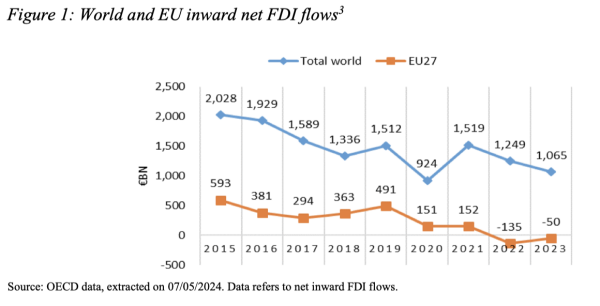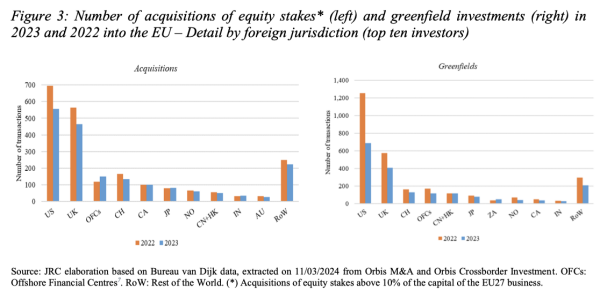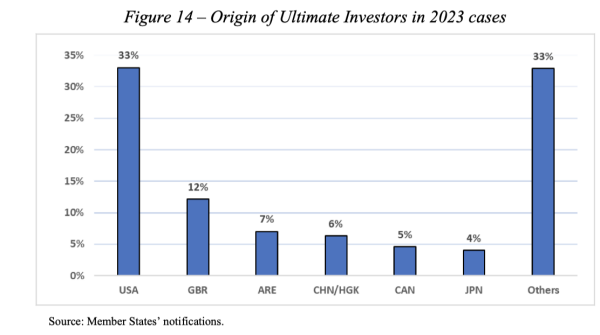CCCEU WEEKLY UPDATE 18th Oct: European Commission Releases "Fourth Annual Report on FDI Screening into the Union": China Ranks Fourth in FDI Cases Screened by the EU
Editor's Note: Greeting! On Thursday, the European Commission (EC) released the 2023 Annual Report on the Screening of Foreign Direct Investment (FDI) into the EU, which revealed that China (including Hong Kong) ranked fourth in terms of the number of FDI cases screened by the EU last year, accounting for 6% of the total cases. Additionally, the EC announced an anti-dumping investigation into imports of headless screws originating from China, marking the 20th investigation launched against China this year under the EU's trade and competition tools. In the field of cultural exchange, Chinese senior official stated that China and the EU will further strengthen cooperation in promoting women's participation in STEM education. Dive into this edition of the CCCEU Weekly Update for the latest insights on China-EU dynamics. Enjoy reading and have a fantastic weekend.
Focus
On October 17, 2024, the European Commission (EC) released its "Fourth Annual Report on the Screening of Foreign Direct Investments (FDI) into the European Union." This report sheds light on the shifting landscape of FDI flows in 2023, exploring global investment trends, EU legislative developments, and the EU's increasing focus on screening FDI. Below are key insights from the report:
2023 Global Foreign Direct Investment Trends
According to the report, global FDI inflows dropped for the second consecutive year, falling by approximately 15% to just over €1 trillion—below 2021 levels. The world's two largest economies, China and the United States, also saw declines in FDI, with China's inflows decreasing by 8% and the U.S. by 6.2%. For the EU, FDI inflows increased slightly compared to 2022, but net flows remained negative at €-50 billion. This was largely due to major disinvestments in key economies such as the Netherlands and Luxembourg, as multinationals continued to pull out capital.

In the EU, the United States continued to dominate as the largest foreign investor in 2023, accounting for 30% of all mergers and acquisitions (M&A) deals, as well as 36% of greenfield investments (projects where new facilities are built from scratch). The UK followed closely behind, contributing 25% of M&A deals and 21% of greenfield investments, although both categories saw significant declines. For example, the number of U.S. greenfield projects dropped by a staggering 45%, a sign of the shifting priorities in global investment flows.
China (including Hong Kong) was the EU's 9th largest M&A investor and the 5th largest in greenfield investments in 2023, though its activity has cooled. M&A transactions from China fell by 9.1%, and greenfield investments experienced a slight decrease of 0.9%.

Distribution of FDI in Key EU Markets and Sectors
In 2023, the EU saw fewer M&A transactions overall, with most countries experiencing a decline compared to the previous year. In terms of investment destination, Germany and Spain emerged as the top destinations for foreign investors, each accounting for 19% (349 deals) and 17% (323 deals) of all foreign acquisitions, respectively. However, both countries witnessed an approximate 9% drop in M&A deals year-on-year. Other prominent destinations included France (13%), Italy (7.9%), and Ireland (7.6%).
Italy and the Netherlands were hit particularly hard, experiencing the sharpest declines in M&A transactions, dropping by 29% and 40%, respectively. However, there were bright spots: Poland, Finland, and Ireland saw increases in acquisition activity, with Poland's M&A deals rising by 70%, Finland by 33%, and Ireland by 4.4%.
Spain led the pack in greenfield investments, attracting 24% of all projects, followed closely by France and Germany, with each securing 11% of greenfield activity. However, the number of greenfield investment projects in Germany saw a significant decrease of 48%, while in France and Spain, the numbers also fell by 29% and 9.9%, respectively.
From a sectoral perspective, manufacturing was the top target for foreign acquisitions in the EU, accounting for 26% of all deals, followed by Information and Communications Technology (ICT) with a 23% share. However, ICT acquisitions fell sharply by 25% compared to 2022, while manufacturing saw a milder decline of 6.8%. Professional, scientific, and technical (PST) activities accounted for 12% of foreign acquisitions, marking the only sector to experience growth (+12%) year-on-year.
In terms of greenfield investments, retail-related activities were the dominant sector, accounting for 33% of foreign direct investment projects. Manufacturing followed with a 12% share of projects. ICT experienced the largest year-on-year decline, with a 59% drop in greenfield projects, while manufacturing saw a relatively smaller decline of 10%.
FDI Screening in the EU in 2023
The report also highlighted the EU's intensified focus on screening FDI for potential security risks. Under the FDI Screening Regulation, member states are permitted to review foreign investments on security grounds, sharing information on potential risks. In 2023, 18 member states submitted 488 notifications to the cooperation mechanism—a 16% increase compared to the 421 notifications submitted in 2022.
Among the FDI screening cases, the primary sources were the United States, the United Kingdom, the United Arab Emirates, China (including Hong Kong), Canada, and Japan. China accounted for 6% of the total screenings, ranking fourth among FDI source countries, up slightly from 5.4% in 2022.
Notably, A report from Rhodium Group, released on October 1, discussed the EU's "toolbox" for regulating Chinese FDI, particularly in the electric vehicle (EV) sector, and highlighted seven available mechanisms, including the Foreign Subsidies Regulation.

In terms of process, the vast majority (92%) of the 488 cases submitted in 2023 were concluded in the first phase, within 15 days of the member state's notification. Only 8% of cases proceeded to the second phase for more detailed security risk assessments.
Among the cases that underwent second-phase screening, manufacturing dominated, accounting for nearly 40% of the submitted transactions. "Critical technologies" were the primary focus, driving further evaluation in 51% of cases. Specifically, defense-related activities accounted for 26% of the relevant cases, followed by aerospace (22%) and semiconductors (17%).
By the end of 2023, 23 EU member states had enacted FDI screening legislation, compared to just 14 when the EU cooperation mechanism came into effect in 2021. Additionally, several member states that lacked screening mechanisms were in the process of drafting new legislation to enhance their security frameworks.
News
Nuctech secures €15 million order from Italy in september
According to South China Morning Post, Chinese company Nuctech secured two contracts totaling approximately €15 million during September tenders issued by the Italian government. One contract, valued at around €11.28 million, is for six wheel-mounted mobile scanning systems designed to inspect trucks at various Italian ports. The second contract, worth about €4.779 million, is for four mobile scanners equipped with "backscatter" technology, which produces chalklike X-ray images of the scanned item or person.
It is reported that both contracts are funded by the European Commission's Customs Control Equipment Instrument (CCEI) budget, a €1 billion programme approved in 2021 to upgrade and harmonise customs systems across the EU
The EC initiates anti-dumping investigation on Chinese headless screws
On October 17, 2024, the EC launched an anti-dumping investigation concerning imports of screws without heads originating from China. This move follows a complaint lodged by the European Industrial Fasteners Institute (EIFI) on behalf of the EU fastener industry.
Senior official says to join EU for women's broad, in-depth participation in STEM education
According to Xinhua, Chinese State Councilor Shen Yiqin on Tuesday said China is ready to work with the European Union (EU) to continue to promote women's broad and in-depth participation in science, technology, engineering and mathematics (STEM) education.
UK Foreign Secretary David Lammy to visit China
Chinese foreign ministry spokesperson Mao Ning announced on Thursday that Secretary of State for Foreign, Commonwealth, and Development Affairs of the United Kingdom David Lammy will pay an official visit to China from Oct. 18 to 19.
Chinese automakers push forward with growth plans despite tariff hurdles
Xinhua reported that Chinese automakers are pushing forward with their development plans despite protectionist tariff threats from the European Union.
Nine leading Chinese brands, including BYD, Xpeng, and Leapmotor, showcased new electric vehicle (EV) models at the 2024 Paris Motor Show, highlighting their technological advancements and determination to grow.
Chinese Electric Truckmaker Windrose Technology Pushes Into Europe, Doubles IPO Goal
Chinese electric truck start-up Windrose Technology Inc. plans to expand in the heart of Europe, manufacturing vehicles in France and Belgium, where it is also considering a listing, according to founder Wen Han.
China, CEEC pledge to deepen cooperation at local level
China and Central and Eastern European Countries (CEEC) on Wednesday expressed their willingness to deepen cooperation at the local level to promote steady and long-term cooperation between China and CEEC, according to Xinhua.
ECB Cuts Interest Rates for the Third Time This Year
The ECB cut interest rates to 3.25% on Thursday, saying inflation in the euro zone was increasingly under control while the outlook for the bloc's economy was worsening.
What are the experts talking about?
Cognitive Shift in the EU's Perception of China and Its Impact
Source: Modern International Relations
Authors: Zhao Ke, Tang Yaozhuo
Recently, the European Union's perception of China has undergone a significant shift. The EU now views China's economic model as detrimental to its own economic competitiveness and sees China's development as a challenge to the Western-dominated international order, undermining the EU's strategic position. In response, the EU has actively promoted its "Indo-Pacific Strategy" and strengthened transatlantic coordination on China policy, adopting a more "confrontational" stance aimed at "rebalancing" the EU-China economic relationship.
As geopolitical considerations increasingly influence the EU's China policy, the bilateral relationship has witnessed a "security turn." The depth of economic and trade ties between the two sides has diminished, and pragmatic cooperation has faced greater challenges due to ideological differences. However, the EU-China relationship still possesses strong internal drivers and vast potential for future development. Both sides remain staunch defenders of multilateralism, and the EU will need to cooperate with China to address global challenges. Thus, constraints remain on how far the EU can adjust its China policy.
European Union duties on electric vehicles point to the new era of EU-China relations
Source: Bruegel
Authors: Alicia García-Herrero
The European Commission narrowly passed a decision to impose countervailing duties on Chinese electric vehicles (EVs) after strong internal division, with key EU members like Germany voting against the measure. China applied pressure by launching investigations into European exports and threatening to reduce foreign investment. Despite the EU's effort to "de-risk" its dependency on China, European reliance on Chinese imports and investments, particularly in the auto sector, continues to grow. Germany's vote highlights the influence of major European companies operating in China on EU trade policy. The EU's economic dependence on China contrasts with the US and Canada's more decisive distancing strategies.
For the EU to compete effectively, it needs to move beyond defensive measures like tariffs and instead focus on building competitiveness. China's EV production benefits from economies of scale and technological upgrades, much of which originated from Western innovations without adequate support. The US has adopted industrial policies to counteract this, while the EU is still lagging in creating an industrial strategy. To reduce dependence on China and mitigate retaliation, the EU must strengthen its single market, build partnerships globally, and coordinate with like-minded economies on economic security. The duties on Chinese EVs mark a shift from cooperation to competition between China and the EU, emphasizing the need for fair trade rules.
Please note: the English version of this issue is slightly different
from our Chinese one. The views and opinions expressed in this article
do not necessarily reflect the official position of the CCCEU.

 Login
Login Login
Login CCCEU and Gunnercooke Successfully Host Webinar on CSDDD and FLR Compliance to Guide Chinese Businesses
CCCEU and Gunnercooke Successfully Host Webinar on CSDDD and FLR Compliance to Guide Chinese Businesses Cultivating responsible China-EU business leaders essential to tackling global challenges
Cultivating responsible China-EU business leaders essential to tackling global challenges



